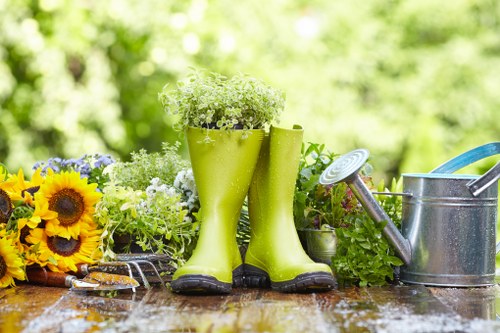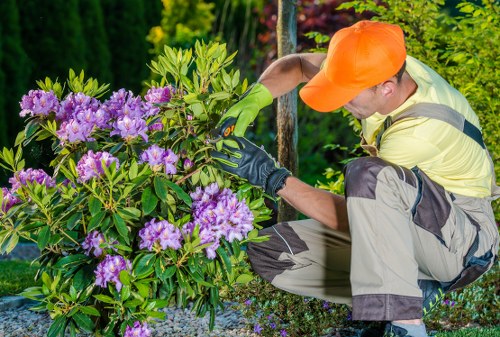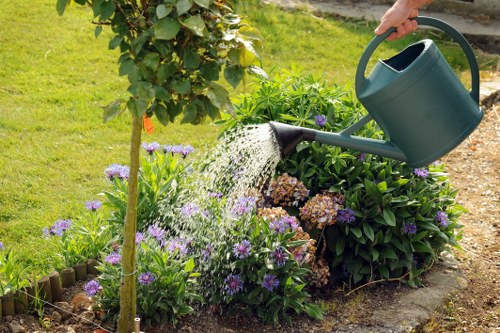Comprehensive Guide to Garden Maintenance in Kilburn

Maintaining a beautiful garden in Kilburn requires dedication, knowledge, and the right set of tools. Whether you're a seasoned gardener or a beginner, understanding the essentials of garden maintenance can transform your outdoor space into a lush, vibrant haven.
Garden maintenance encompasses a variety of tasks, from pruning and weeding to soil management and pest control. Each of these tasks plays a crucial role in ensuring the health and beauty of your garden year-round.
In Kilburn, the unique climate and local flora pose specific challenges and opportunities for gardeners. Adapting your maintenance practices to suit the local environment can lead to more sustainable and thriving garden spaces.
Essential Garden Maintenance Tasks

To maintain a flourishing garden in Kilburn, it's important to focus on several key maintenance tasks. These tasks not only enhance the aesthetic appeal but also promote the overall health of your plants.
1. Pruning: Regular pruning helps in removing dead or diseased branches, allowing for better air circulation and sunlight penetration. This encourages healthy growth and prevents the spread of pests and diseases.
2. Weeding: Weeds compete with your plants for nutrients, water, and sunlight. Timely removal of weeds ensures that your garden plants can thrive without unnecessary competition.
Soil Management

Healthy soil is the foundation of a vibrant garden. In Kilburn, where soil types can vary, understanding and managing your soil is crucial. Regularly testing your soil's pH and nutrient levels can help you make informed decisions about fertilization and soil amendments.
Adding organic matter, such as compost or well-rotted manure, improves soil structure, enhances nutrient availability, and promotes beneficial microbial activity. This leads to healthier plant growth and resilience against pests and diseases.
Mulching is another effective soil management technique. A layer of mulch helps retain soil moisture, suppresses weed growth, and regulates soil temperature, creating an optimal environment for your plants.
Pest and Disease Control

Early detection and management of pests and diseases are vital for maintaining a healthy garden. Regularly inspecting your plants for signs of infestation or disease can prevent minor issues from escalating into major problems.
Implementing integrated pest management (IPM) strategies, such as introducing beneficial insects, using organic pesticides, and practicing crop rotation, can effectively control pest populations while minimizing environmental impact.
Maintaining good garden hygiene by removing fallen leaves and debris reduces hiding spots for pests and breeding grounds for diseases, contributing to the overall health of your garden.
Seasonal Maintenance Tips

Adapting your maintenance practices according to the seasons ensures that your garden remains vibrant throughout the year. In Kilburn, each season presents unique challenges and opportunities for garden maintenance.
Spring: Focus on planting new seedlings, pruning flowering shrubs, and preparing your garden beds with fresh soil amendments.
Summer: Regular watering, mulching, and pest monitoring are essential to keep your plants thriving during the warmer months.
Choosing the Right Garden Maintenance Services in Kilburn

Opting for professional garden maintenance services can alleviate the workload and ensure that your garden receives expert care. When selecting a service provider in Kilburn, consider the following factors:
- Experience and Expertise: Choose a company with a proven track record and knowledgeable staff who understand the local climate and plant varieties.
- Comprehensive Services: Ensure the service offers a wide range of maintenance tasks, from mowing and pruning to pest control and soil management.
- Customer Reviews: Positive testimonials and reviews can provide insight into the quality and reliability of the service provider.
Customized Maintenance Plans

Every garden is unique, and a one-size-fits-all approach may not be effective. Professional services offer customized maintenance plans tailored to your garden's specific needs.
These plans take into account factors like plant types, soil conditions, and personal preferences, ensuring that your garden receives personalized care that promotes its health and beauty.
Customized plans also offer flexibility, allowing you to adjust the level of maintenance based on seasonal changes or evolving garden requirements.
Eco-Friendly Maintenance Practices

Eco-friendly garden maintenance not only benefits the environment but also contributes to the long-term sustainability of your garden. Practices such as using organic fertilizers, minimizing chemical pesticide use, and implementing water conservation techniques are essential.
In Kilburn, embracing sustainable maintenance methods can lead to a healthier ecosystem, attracting beneficial insects and promoting biodiversity within your garden.
Additionally, sustainable practices often result in cost savings by reducing the need for frequent chemical applications and improving soil health naturally.
Tools and Equipment for Effective Maintenance

Having the right tools and equipment is crucial for efficient garden maintenance. Essential tools include pruners, shears, spades, hoes, and watering systems.
Investing in high-quality, durable tools can enhance your maintenance efforts and reduce the time and effort required to perform various tasks.
For larger gardens, consider automated systems like irrigation timers and lawn mowers to streamline maintenance activities and ensure consistent care.
Benefits of Regular Garden Maintenance

Regular garden maintenance offers numerous benefits that contribute to the overall appeal and functionality of your outdoor space.
Enhanced Aesthetic Appeal: Well-maintained gardens are visually appealing, creating a welcoming and enjoyable environment for you and your guests.
Increased Property Value: A beautiful garden can significantly boost your property's value, making it more attractive to potential buyers.
Healthier Plants

Healthy plants are the cornerstone of a vibrant garden. Regular maintenance ensures that your plants receive the necessary care to thrive, leading to robust growth and resilience against diseases.
Proper watering, feeding, and pruning stimulate healthy development, resulting in lush foliage, abundant blooms, and fruitful yields.
Healthy plants also contribute to a balanced garden ecosystem, supporting beneficial insects and promoting natural pest control.
Environmental Benefits

Maintaining a garden has positive environmental impacts. Gardens can enhance air quality by absorbing carbon dioxide and releasing oxygen, contributing to a cleaner atmosphere.
They also provide habitats for various wildlife, promoting biodiversity and supporting local ecosystems.
Furthermore, sustainable maintenance practices like composting reduce waste and improve soil health, fostering a more sustainable environment.
Personal Well-Being

Gardening and garden maintenance offer significant mental and physical health benefits. Engaging in gardening activities can reduce stress, improve mood, and promote relaxation.
Physical tasks involved in maintenance, such as digging, planting, and weeding, provide a form of exercise that enhances strength and flexibility.
Spending time outdoors in a well-maintained garden encourages a connection with nature, fostering a sense of accomplishment and satisfaction.
Seasonal Garden Maintenance in Kilburn

Adapting your maintenance routine to the changing seasons ensures that your garden remains healthy and vibrant throughout the year.
Each season in Kilburn brings its own set of challenges and opportunities, requiring specific maintenance strategies to address weather changes, plant cycles, and environmental factors.
By aligning your maintenance practices with seasonal demands, you can optimize plant growth, prevent potential issues, and maintain an attractive garden all year round.
Spring Maintenance

Spring is a pivotal season for garden maintenance as it marks the transition from dormancy to active growth. Key tasks include:
- Clearing debris and fallen leaves accumulated over winter.
- Pruning shrubs and trees to encourage new growth.
- Planting new flowers, vegetables, and shrubs to establish your garden for the upcoming months.
- Testing and amending soil to ensure optimal nutrient levels for plant health.
Implementing these tasks in spring sets the foundation for a thriving garden throughout the year.
Summer Maintenance

Summer brings warm weather and longer days, presenting both opportunities and challenges for garden maintenance.
Essential summer maintenance tasks include:
- Regular watering to keep plants hydrated during hot periods.
- Mulching to retain soil moisture and suppress weed growth.
- Monitoring for pests and diseases, taking prompt action to mitigate any issues.
- Deadheading spent blooms to encourage continuous flowering.
Effective summer maintenance ensures that your garden remains lush and vibrant despite the heat.
Autumn Maintenance

Autumn is a time for preparing your garden for the colder months ahead. Key maintenance activities include:
Leaf Management: Regularly rake and remove fallen leaves to prevent them from suffocating the soil and harboring pests.
Planting Cover Crops: Introducing cover crops helps improve soil structure and fertility, setting the stage for a healthy garden in the spring.
Pruning: Trim back overgrown plants and remove any dead or diseased branches to promote healthy growth in the next season.
DIY vs. Professional Garden Maintenance

Deciding between DIY garden maintenance and hiring professionals depends on various factors including time, expertise, and the size of your garden.
- DIY Maintenance: Ideal for small to medium-sized gardens, DIY maintenance offers cost savings and personal satisfaction. It allows you to tailor care routines to your preferences and schedule.
- Professional Services: Best suited for larger gardens or those requiring specialized care. Professionals bring expertise, efficiency, and access to specialized tools, ensuring high-quality maintenance.
In Kilburn, many homeowners find a combination of DIY and professional maintenance to be the most effective approach, leveraging the strengths of both methods.
When to Hire Professionals

Hiring professional garden maintenance services can be beneficial in the following scenarios:
- Complex Landscaping: Gardens with intricate designs or diverse plant species may require specialized knowledge for proper care.
- Time Constraints: Busy schedules can make it challenging to dedicate sufficient time to garden maintenance.
- Pest and Disease Issues: Professional expertise is often necessary to effectively manage and prevent infestations and diseases.
- Seasonal Overhauls: Preparing the garden for seasonal changes may require comprehensive projects best handled by experts.
Engaging professionals ensures that these tasks are performed efficiently and effectively, maintaining the health and beauty of your garden.
Cost Considerations

Budget is an important factor when deciding between DIY and professional garden maintenance. While DIY can be cost-effective, it may involve time investment and the purchase of tools and materials.
Professional services, although involving upfront costs, can offer long-term savings by preventing costly plant replacements and addressing issues promptly.
It's important to assess your budget, prioritize maintenance needs, and choose the option that offers the best value and results for your specific situation.
Combining DIY and Professional Services

A hybrid approach, combining DIY tasks with professional services, can provide a balanced solution for garden maintenance. For instance, you can handle routine tasks like weeding and watering, while leaving specialized tasks like pruning large trees or soil testing to professionals.
This approach allows you to maintain control over your garden while benefiting from expert care where it's most needed.
Additionally, it can help manage costs effectively, leveraging the strengths of both DIY and professional methods.
Choosing the Right Plants for Kilburn Gardens

Selecting the right plants is fundamental to the success of your garden. In Kilburn, the climate and soil conditions influence which plants will thrive.
- Native Plants: These plants are adapted to the local climate and soil, requiring less maintenance and water.
- Seasonal Flowers: Incorporating a variety of flowers that bloom in different seasons ensures a continuous display of color and interest in your garden.
- Evergreens: These provide year-round greenery and structure, adding depth to your garden design.
Consulting with local nurseries or garden centers can help you identify the best plant varieties for your specific garden conditions.
Flower Beds and Borders

Designing effective flower beds and borders involves choosing plants that complement each other in terms of color, size, and blooming periods.
Grouping plants with similar water and soil requirements ensures ease of maintenance and promotes healthy growth.
Incorporating layers of plants, from ground covers to taller shrubs, adds dimension and interest to your garden layout.
Vegetable and Herb Gardens

Establishing a vegetable and herb garden can provide fresh produce and enhance the functionality of your outdoor space.
- Planning: Determine the layout based on sunlight exposure, soil quality, and space availability.
- Plant Selection: Choose vegetables and herbs that are well-suited to Kilburn's climate and your personal culinary preferences.
- Maintenance: Regular watering, fertilization, and pest management are essential for a productive garden.
Growing your own vegetables and herbs can be a rewarding aspect of garden maintenance, offering both aesthetic and practical benefits.
Ornamental Trees and Shrubs

Ornamental trees and shrubs add structure and height to your garden, creating focal points and defining spaces.
Selecting species that provide seasonal interest through flowering, foliage color changes, or unique bark textures enhances the garden's visual appeal throughout the year.
Proper placement and spacing of these larger plants are crucial to prevent overcrowding and ensure healthy growth.
Watering Strategies for a Thriving Garden

Effective watering is fundamental to garden maintenance, ensuring that plants receive the necessary hydration without overwatering.
Implementing efficient watering strategies can conserve water, reduce maintenance efforts, and promote healthier plant growth.
In Kilburn, where weather patterns can vary, adapting your watering practices to the seasonal demands is essential.
Drip Irrigation Systems

Drip irrigation systems provide targeted watering directly to the plant roots, minimizing water waste and reducing the risk of fungal diseases.
These systems are highly efficient, especially in areas with water restrictions or for gardens with diverse plant types requiring different watering needs.
Installing a drip irrigation system can save time and resources while ensuring consistent moisture levels for your plants.
Rainwater Harvesting

Harvesting rainwater is an eco-friendly watering strategy that reduces reliance on municipal water sources and promotes sustainable garden practices.
Setting up rain barrels or other collection systems can capture and store rainwater for use during dry periods.
Rainwater is often softer and free from chemicals like chlorine, making it beneficial for plant health.
Mulching Techniques

Mulching involves applying a layer of organic or inorganic material over the soil surface, offering multiple benefits for your garden.
- Moisture Retention: Mulch helps retain soil moisture, reducing the need for frequent watering.
- Temperature Regulation: It insulates the soil, keeping it cooler in summer and warmer in winter.
- Weed Suppression: Mulch inhibits the growth of weeds by blocking sunlight and preventing seed germination.
Organic mulches, such as bark or compost, also contribute to soil fertility as they decompose over time.
Pruning and Trimming for Garden Health

Pruning and trimming are essential maintenance practices that promote healthy plant growth, enhance shapes, and encourage flowering.
Regular pruning removes dead or diseased branches, improves air circulation, and allows more sunlight to reach the plant canopy.
Trimming also helps maintain desired shapes and sizes, preventing plants from becoming overgrown and out of control.
Tools for Effective Pruning

Investing in quality pruning tools ensures precision and efficiency in maintenance tasks. Essential tools include:
- Pruning Shears: Ideal for cutting small branches and stems with accuracy.
- Loppers: Suitable for thicker branches that require more force to cut.
- Pruning Saws: Necessary for larger branches that are beyond the capacity of loppers.
Keeping these tools clean and sharp prolongs their lifespan and ensures the health of your plants.
Pruning Techniques

Applying proper pruning techniques is crucial for promoting plant health and aesthetics.
Angle Cuts: Make cuts at a 45-degree angle to prevent water accumulation and reduce the risk of disease.
Thinning: Remove entire branches at their base to open up the plant structure and improve air flow.
Heading: Shorten branches by cutting back to a bud or lateral branch to encourage bushier growth.
Seasonal Pruning Guidelines

Different plants require pruning at specific times to optimize growth and flowering.
- Spring-Flowering Plants: Prune immediately after flowering to avoid cutting off next season's buds.
- Summer-Flowering Plants: Prune in late winter or early spring before new growth begins.
- Fruit Trees: Perform pruning in late winter while the trees are dormant to shape and enhance fruit production.
Following these guidelines ensures that your pruning efforts align with the natural growth cycles of your plants.
Pest and Disease Management

Managing pests and diseases is a critical aspect of garden maintenance that protects plant health and maintains garden aesthetics.
Effective management involves a combination of prevention, monitoring, and treatment strategies to address issues promptly and minimize impact.
In Kilburn, where specific pests and diseases may be prevalent, tailored approaches are essential for successful management.
Identifying Common Pests

Common garden pests in Kilburn include aphids, slugs, snails, and caterpillars. Recognizing the signs of infestation is the first step in effective pest control.
- Aphids: Small, sap-sucking insects that cause leaves to curl and yellow.
- Slugs and Snails: Mollusks that feed on plant tissues, leaving irregular holes.
- Caterpillars: Larval stage of butterflies and moths that can defoliate plants.
Regularly inspecting your plants for these pests allows for timely intervention before significant damage occurs.
Organic Pest Control Methods

Organic pest control methods offer environmentally friendly alternatives to chemical pesticides, promoting a healthier garden ecosystem.
Biological Control: Introducing natural predators, such as ladybugs and praying mantises, can help keep pest populations in check.
Neem Oil: A natural pesticide that disrupts the life cycle of pests without harming beneficial insects.
Integrated Pest Management (IPM)

Integrated Pest Management (IPM) is a holistic approach that combines multiple strategies for effective pest control.
- Monitoring: Regularly assess pest populations and plant health.
- Prevention: Implement cultural practices like crop rotation and sanitation to prevent pest outbreaks.
- Treatment: Use targeted interventions, such as biological controls or organic pesticides, when necessary.
IPM emphasizes sustainable practices that minimize environmental impact while maintaining garden health.
Soil Health and Fertility

Maintaining healthy soil is fundamental to successful garden maintenance. Soil health affects plant growth, nutrient uptake, and resistance to pests and diseases.
In Kilburn, understanding your soil type and current health status is essential for implementing effective soil management practices.
Regular soil testing provides valuable insights into pH levels, nutrient deficiencies, and soil composition, guiding your fertilization and amendment efforts.
Amending the Soil

Soil amendments improve soil structure, fertility, and drainage, creating optimal conditions for plant root systems.
- Compost: Adds organic matter, enhancing soil fertility and microbial activity.
- Sand: Improves drainage in heavy clay soils, preventing waterlogging.
- Lime or Sulfur: Adjusts soil pH levels to suit specific plant requirements.
Regularly amending your soil ensures that it remains conducive to healthy plant growth and resilience.
Fertilization Practices

Proper fertilization provides plants with essential nutrients needed for growth and development.
Choosing the right type of fertilizer—organic or synthetic—depends on your garden goals and environmental considerations.
Organic fertilizers, such as fish emulsion or bone meal, release nutrients slowly, improving soil health over time without the risk of chemical buildup.
Composting for Soil Enrichment

Composting is a sustainable practice that recycles organic waste into nutrient-rich compost, enhancing soil fertility and structure.
Setting up a compost bin in your garden provides a continuous supply of natural fertilizer, reducing waste and promoting eco-friendly gardening.
Regularly turning the compost and maintaining proper moisture levels accelerates decomposition and produces high-quality compost for your garden.
Conclusion

Maintaining a garden in Kilburn involves a combination of essential tasks, informed choices, and sustainable practices. By understanding the local environment, selecting appropriate plants, and implementing effective maintenance strategies, you can cultivate a thriving and beautiful garden.
Whether you choose to handle maintenance yourself or enlist professional services, prioritizing regular care ensures that your garden remains a source of pride and enjoyment for years to come.
Ready to transform your outdoor space? Contact us today to book your garden maintenance service and enjoy a vibrant, lush garden in Kilburn!
